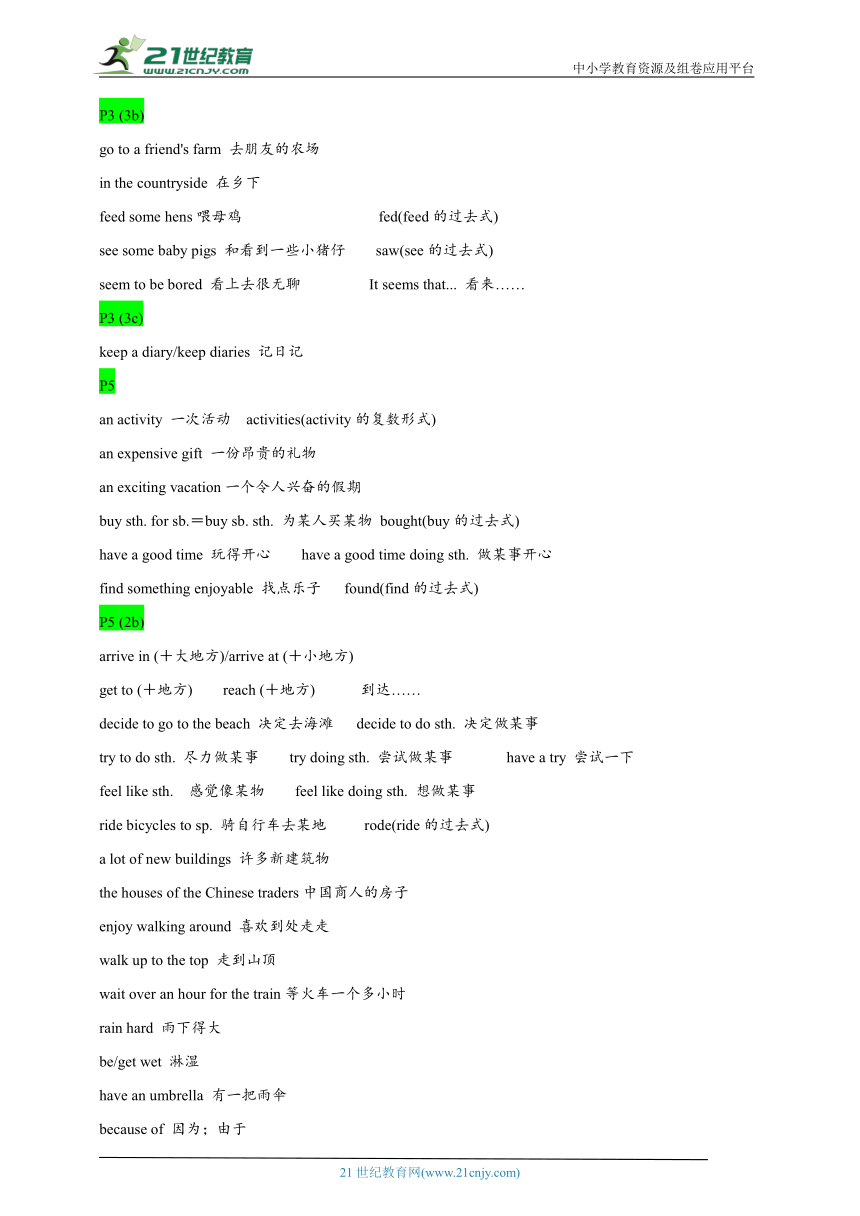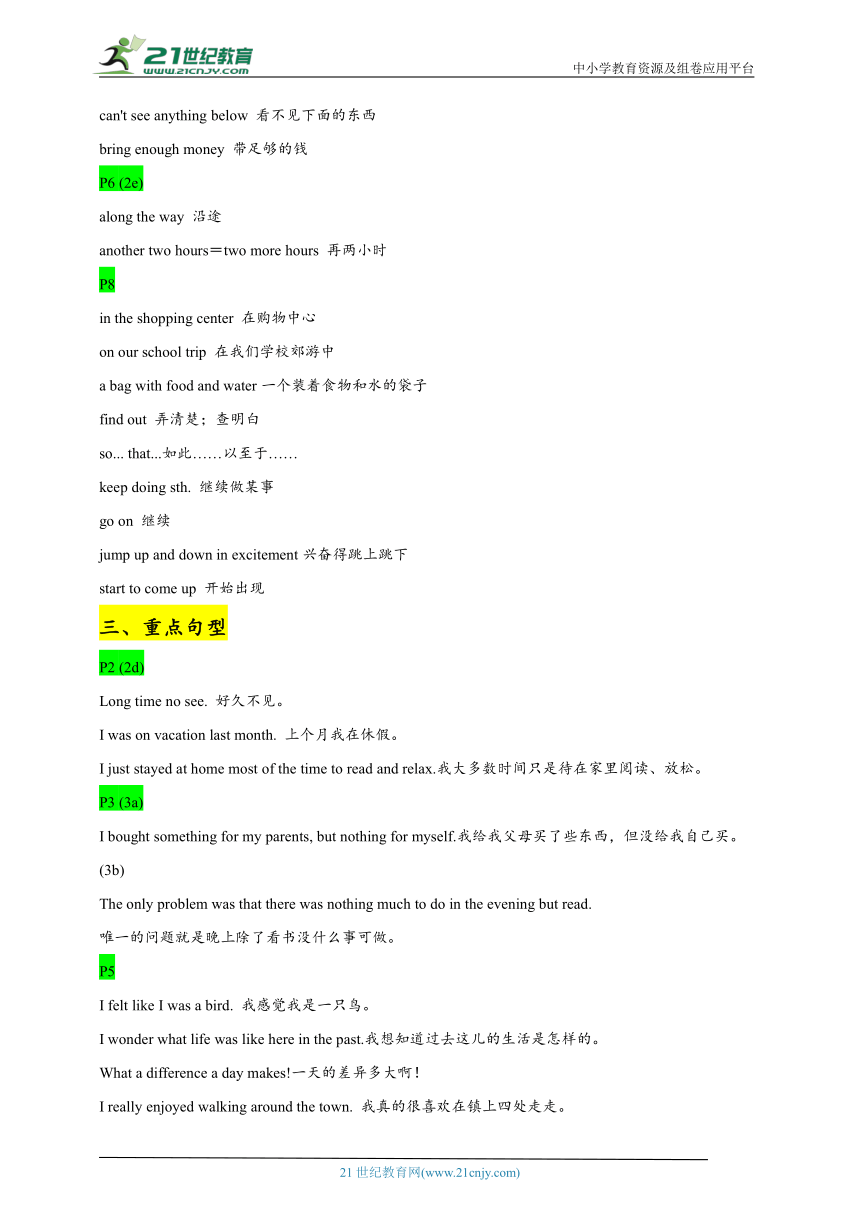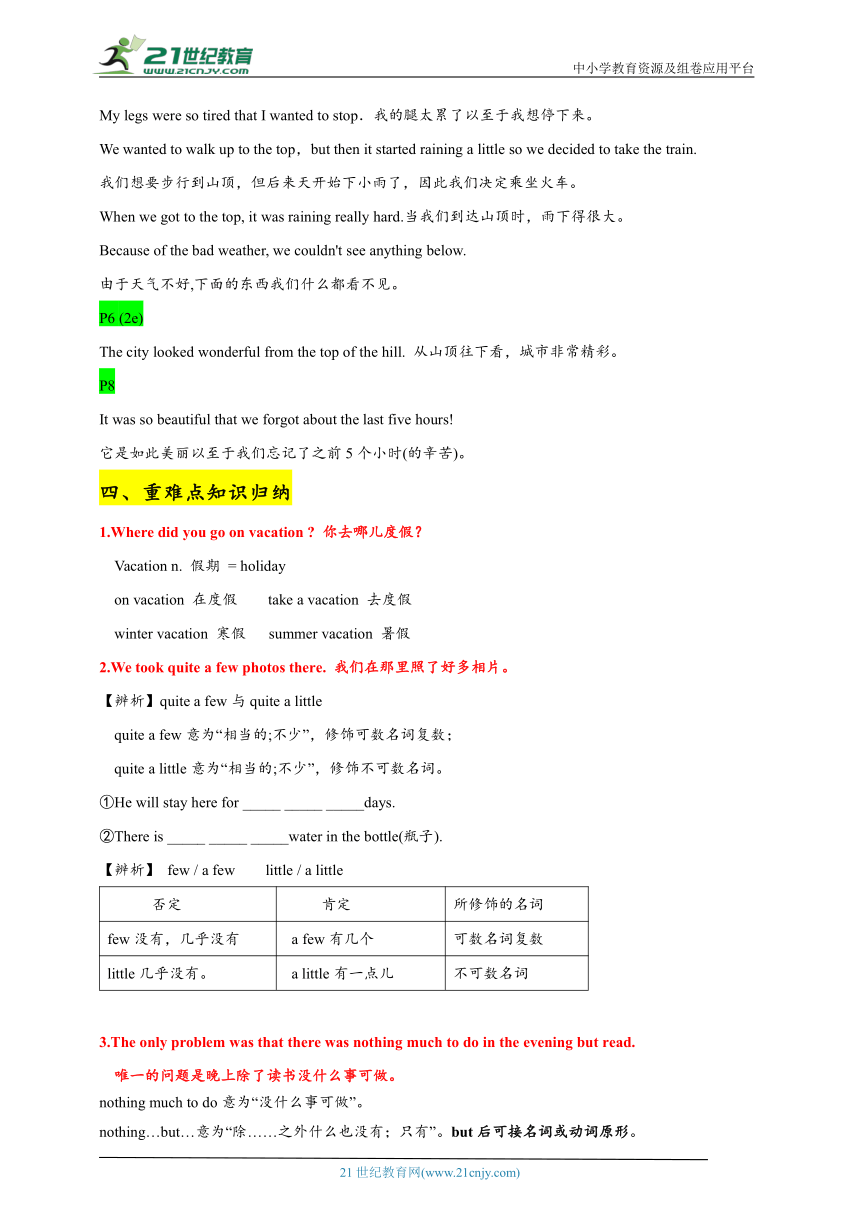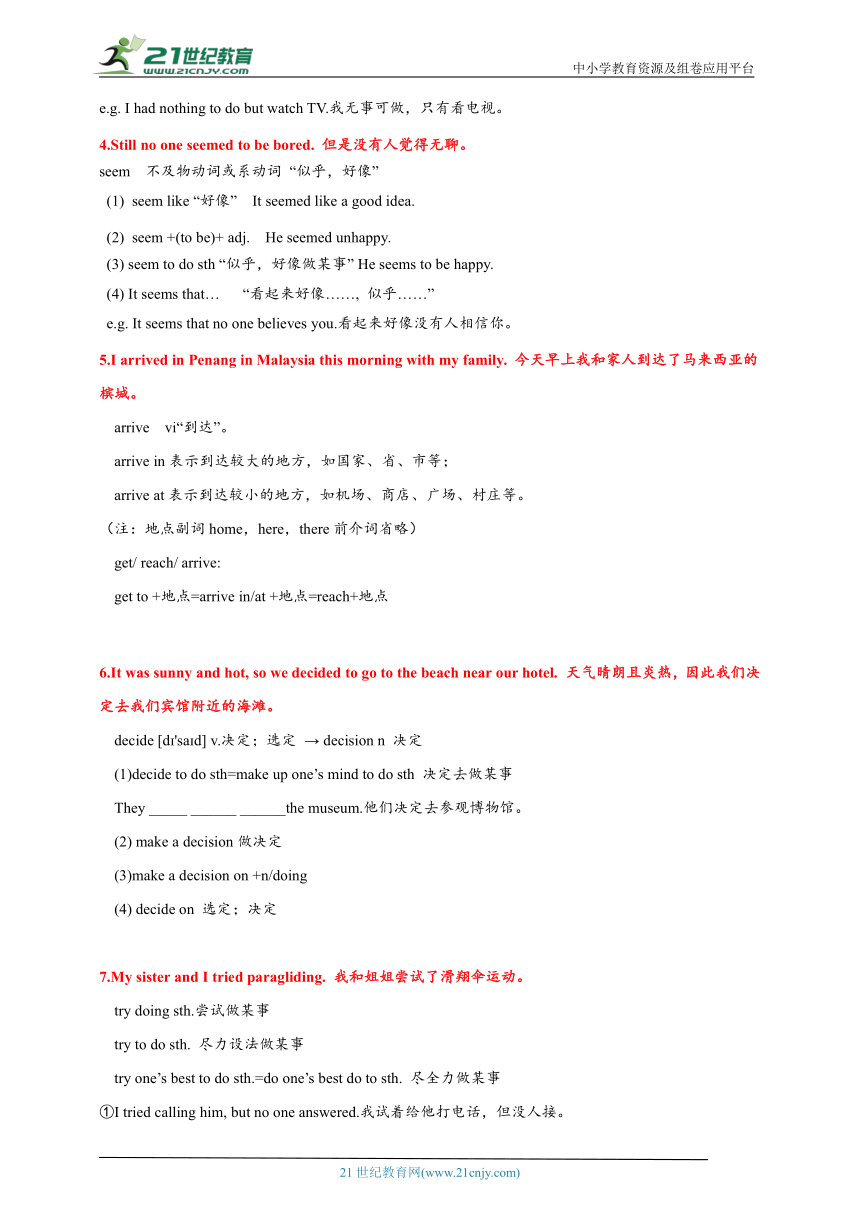Unit 1 Where did you go on vacation.知识点归纳总结学案
文档属性
| 名称 | Unit 1 Where did you go on vacation.知识点归纳总结学案 |  | |
| 格式 | doc | ||
| 文件大小 | 1.8MB | ||
| 资源类型 | 试卷 | ||
| 版本资源 | 人教新目标(Go for it)版 | ||
| 科目 | 英语 | ||
| 更新时间 | 2023-07-02 17:33:49 | ||
图片预览





文档简介
中小学教育资源及组卷应用平台
Unit1 Where did you go on vacation
一、词汇拓展
1.日记n. diary pl. diaries
2.使厌倦v. bore 令人厌倦的adj. boring 厌倦的;烦闷的adj. bored
v. 想知道;琢磨
3. wonder
n.奇迹;惊讶 adj. 精彩的;绝妙的 wonderful
4.湿的adj. wet 干的adj. dry (反义词) 潮湿的;湿热的 adj. humid (近义词)
5.做生意v. trade 商人n. trader商人 n. businessman (近义词)
6.决定;选定v. decide决定;抉择n. decision
7.不同的adj. different 差别;差异n. difference
相同的adj. same (反义词)
8.喜欢v. like 不喜欢v.(反义词) dislike
9.饥饿n. hunger 饥饿的adj. hungry 饱的adj.(反义词) full
10.欣赏;喜爱v. enjoy 有乐趣的;令人愉快的adj. enjoyable
11.活跃的adj. active 活动n. activity
(二)、重点短语
P1 (1a)
stay at home 待在家里 stayed (stay的过去式)
go to the mountains 去山上 went (go的过去式)
go to summer camp 去夏令营
visit museums 参观博物馆
P2(2b)
meet someone interesting 碰见某个有趣的人 met(meet的过去式)
do something interesting 做些有趣的事
study for tests 为考试做准备
P2 (2d)
be on vacation 在度假
didn't go anywhere wonderful 没有去精彩的地方
take quite a few photos拍了不少的照片
P3 (3b)
go to a friend's farm 去朋友的农场
in the countryside 在乡下
feed some hens喂母鸡 fed(feed的过去式)
see some baby pigs 和看到一些小猪仔 saw(see的过去式)
seem to be bored 看上去很无聊 It seems that... 看来……
P3 (3c)
keep a diary/keep diaries 记日记
P5
an activity 一次活动 activities(activity的复数形式)
an expensive gift 一份昂贵的礼物
an exciting vacation一个令人兴奋的假期
buy sth. for sb.=buy sb. sth. 为某人买某物 bought(buy的过去式)
have a good time 玩得开心 have a good time doing sth. 做某事开心
find something enjoyable 找点乐子 found(find的过去式)
P5 (2b)
arrive in (+大地方)/arrive at (+小地方)
get to (+地方) reach (+地方) 到达……
decide to go to the beach 决定去海滩 decide to do sth. 决定做某事
try to do sth. 尽力做某事 try doing sth. 尝试做某事 have a try 尝试一下
feel like sth. 感觉像某物 feel like doing sth. 想做某事
ride bicycles to sp. 骑自行车去某地 rode(ride的过去式)
a lot of new buildings 许多新建筑物
the houses of the Chinese traders中国商人的房子
enjoy walking around 喜欢到处走走
walk up to the top 走到山顶
wait over an hour for the train等火车一个多小时
rain hard 雨下得大
be/get wet 淋湿
have an umbrella 有一把雨伞
because of 因为;由于
can't see anything below 看不见下面的东西
bring enough money 带足够的钱
P6 (2e)
along the way 沿途
another two hours=two more hours 再两小时
P8
in the shopping center 在购物中心
on our school trip 在我们学校郊游中
a bag with food and water一个装着食物和水的袋子
find out 弄清楚;查明白
so... that...如此……以至于……
keep doing sth. 继续做某事
go on 继续
jump up and down in excitement兴奋得跳上跳下
start to come up 开始出现
三、重点句型
P2 (2d)
Long time no see. 好久不见。
I was on vacation last month. 上个月我在休假。
I just stayed at home most of the time to read and relax.我大多数时间只是待在家里阅读、放松。
P3 (3a)
I bought something for my parents, but nothing for myself.我给我父母买了些东西,但没给我自己买。
(3b)
The only problem was that there was nothing much to do in the evening but read.
唯一的问题就是晚上除了看书没什么事可做。
P5
I felt like I was a bird. 我感觉我是一只鸟。
I wonder what life was like here in the past.我想知道过去这儿的生活是怎样的。
What a difference a day makes!一天的差异多大啊!
I really enjoyed walking around the town. 我真的很喜欢在镇上四处走走。
My legs were so tired that I wanted to stop.我的腿太累了以至于我想停下来。
We wanted to walk up to the top,but then it started raining a little so we decided to take the train.
我们想要步行到山顶,但后来天开始下小雨了,因此我们决定乘坐火车。
When we got to the top, it was raining really hard.当我们到达山顶时,雨下得很大。
Because of the bad weather, we couldn't see anything below.
由于天气不好,下面的东西我们什么都看不见。
P6 (2e)
The city looked wonderful from the top of the hill. 从山顶往下看,城市非常精彩。
P8
It was so beautiful that we forgot about the last five hours!
它是如此美丽以至于我们忘记了之前5个小时(的辛苦)。
四、重难点知识归纳
1.Where did you go on vacation 你去哪儿度假?
Vacation n. 假期 = holiday
on vacation 在度假 take a vacation 去度假
winter vacation 寒假 summer vacation 暑假
2.We took quite a few photos there. 我们在那里照了好多相片。
【辨析】quite a few与quite a little
quite a few意为“相当的;不少”,修饰可数名词复数;
quite a little意为“相当的;不少”,修饰不可数名词。
①He will stay here for _____ _____ _____days.
②There is _____ _____ _____water in the bottle(瓶子).
【辨析】 few / a few little / a little
否定 肯定 所修饰的名词
few没有,几乎没有 a few有几个 可数名词复数
little几乎没有。 a little有一点儿 不可数名词
3.The only problem was that there was nothing much to do in the evening but read.
唯一的问题是晚上除了读书没什么事可做。
nothing much to do意为“没什么事可做”。
nothing…but…意为“除……之外什么也没有;只有”。but后可接名词或动词原形。
e.g. I had nothing to do but watch TV.我无事可做,只有看电视。
4.Still no one seemed to be bored. 但是没有人觉得无聊。
seem 不及物动词或系动词 “似乎,好像”
(1) seem like “好像” It seemed like a good idea.
(1) seem +(to be)+ adj. He seemed unhappy.
(3) seem to do sth “似乎,好像做某事” He seems to be happy.
(4) It seems that… “看起来好像……, 似乎……”
e.g. It seems that no one believes you.看起来好像没有人相信你。
5.I arrived in Penang in Malaysia this morning with my family. 今天早上我和家人到达了马来西亚的槟城。
arrive vi“到达”。
arrive in表示到达较大的地方,如国家、省、市等;
arrive at表示到达较小的地方,如机场、商店、广场、村庄等。
(注:地点副词home,here,there前介词省略)
get/ reach/ arrive:
get to +地点=arrive in/at +地点=reach+地点
6.It was sunny and hot, so we decided to go to the beach near our hotel. 天气晴朗且炎热,因此我们决定去我们宾馆附近的海滩。
decide [d 'sa d] v.决定;选定 → decision n 决定
(1)decide to do sth=make up one’s mind to do sth 决定去做某事
They _____ ______ ______the museum.他们决定去参观博物馆。
(2) make a decision做决定
(3)make a decision on +n/doing
(4) decide on 选定;决定
7.My sister and I tried paragliding. 我和姐姐尝试了滑翔伞运动。
try doing sth.尝试做某事
try to do sth. 尽力设法做某事
try one’s best to do sth.=do one’s best do to sth. 尽全力做某事
①I tried calling him, but no one answered.我试着给他打电话,但没人接。
②I tried my best to get good grades.我尽最大努力取得好成绩。
③I'm trying to learn English well.我正在努力学好英语。
have a try 试一试
try on 试穿
8. I felt like I was a bird. It was so exciting! 我感觉自己就像一只小鸟。太刺激了!
feel like意为“给……的感觉;感受到”。其后常接从句。
eg: He feels like he is swimming. 他感觉像在游泳一样。
拓展:feel like还可意为“想要……”,相当于want. 其后可接名词、代词或动名词。
即:feel like sth. 想要某物
feel like doing sth. 想要做某事
eg:Do you feel like a cup of tea now 你现在想要一杯茶吗?
9. What a difference a day makes! 一天的变化有多大呀!
difference可数名词,意为“差别,差异” ;其形容词形式为different,意为“不同的;有差异的”。
Eg: a. What is the difference between this book and that book
b. My schoolbag is different from yours. ( be different from 意为“与……不同”)
这是由what引导的感叹句,常见有两种形式:
(1)what+a/an+形容词/副词+可数名词单数(+主语+谓语)!
e.g. What a kind girl she is!
(2)What+形容词+复数名词/不可数名词(+主语+谓语)!
e.g. What bad weather!
e.g. What beautiful flowers they are!
由how引导的感叹句也有两种构成方式:
(1)How + 形容词/副词+ 主语+ 谓语!
e.g. How interesting the dog is!
(2)How+形容词+a/an+单数可数名词+主语+谓语!
e.g. How lovely a girl she is!=what a lovely girl she is!
10.We waited over an hour for the train because there were too many people. 因为人太多,所以我们等了一个多小时的火车。
1)wait for意为“等候”,其后可接人或物。
2)wait to do sth 等待做某事
3)can’t wait to do sth 迫不及待的做某事
too many, too much与much too
(1) too many + 复数名词 许多 too many people
(2) too much +不可数名词 许多 too much homework
(3) much too +形容词 太… much too cold
11.And because of the bad weather, we couldn’t see anything below.而且因为坏天气,我们也没能看到下面的任何景色.
辨析:because of与because
a. because of意为“因为,由于”,后可接名词、代词或动名词,不能接句子。
He lost his job because of his age.
b. because意为“因为”,引导状语从句,即接句子。
12.My father didn’t bring enough money… 我爸爸没带足够的钱……
1)辨析:bring与take
bring意为“带来;拿来”, 指从别处带到说话者所在地。
take意为“拿走;带走”, 指从说话者所在地带到别处去。
2)enough 意为“足够的,充分的”
1.用来修饰形容词或副词,一般置于被修饰词之后。
2.用来修饰名词时可放在形容词前面或后面。
Eg:a. We have enough time to do our homework.
b. The box is big enough.
13.because we forgot to bring an umbrella… 因为我们忘了带雨伞。
辨析:forget to do sth.与forget doing sth.
forget to do sth. 意为“忘记要做某事(事情还没做)”
eg: Don’t forget to close the window.
forget doing sth. 意为“忘记做过某事(事情已经做过了)”
eg: I forget closing the window.
五、单元语法精讲
1.反身代词
除第三人称是人称代词宾格加-self或-selves构成外,其余各人称都是形容词性物主代词加-self或-selves构成。
(1)反身代词作宾语,位于及物动词或介词之后。
①They enjoyed themselves very much at the party. 他们在聚会上玩得非常高兴。
②I cut myself with a knife.我用刀把自己割伤了。
【注意】反身代词表示动作回到主语本身,所以它应该与动作发出者在人称和数上保持一致。
(2)反身代词作主语的同位语,起强调作用,此时其位置可在主语之后,也可在句末。如:
①I myself can finish it on time.我自己能准时完成。
②He worked out the problem himself.他自己解决了这个问题。
(3)反身代词的常用词组
teach oneself 自学
learn by oneself 自学
enjoy oneself 过得愉快;玩得开心
by oneself 独自
2.复合不定代词
something, somebody, someone,anything, anybody, anyone, nothing, nobody, no one, everything, everybody,everyone等不定代词。
(1)与形容词连用时,形容词必须置于复合不定代词之后,语法上称作“后置”。
①I bought something special for my mother.我给我妈妈买了样特别的东西。
2 Did you meet anyone interesting 你遇见了有趣的人吗?
(2)复合不定代词都具有单数的含义,当它们做句子的主语时,其后的谓语动词用单数形式。
1 There's something wrong with my bike.我的自行车破了。
2 Nobody knows the answer to thequestion.没人知道这个问题的答案。
(3)在表示请求、邀请、提建议等带有委婉语气的疑问句,和希望得到对方肯定答复的疑问句,以及表示反问的疑问句中,用something, someone,somebody等复合不定代词。
如:Why don't you ask someone to help you 你为什么不叫个人来帮你呢?
(4)当anything表示“任何事(物);无论何事(物)”, anyone, anybody表示“无论谁;任何人”等意义时,它们也可以用于肯定句中。
①Anything is OK. 什么都行。
3 Anybody knows the answer.任何人都知道答案。
3. 过去时态
Ⅰ过去时态的语法结构
(1)肯定形式:
主语+动词过去式+其他。
如:She came to help us last weekend.她上周来帮我们。
(2)否定形式:
1)主语+was/were+not+其他.
2)主语+didn't+动词原形+其他.
如:I didn't know you like coffee.我不知道你喜欢咖啡。
(3)一般疑问句:1)Did+主语+动词原形+其他?
2)Was/Were+主语+表语?
如:Did he finish his homework 他完成他的作业了吗?
(4)特殊疑问句:
1)特殊疑问词+did+主语+动词原形+其他?
2)特殊疑问词+was/were+主语+其他?
如:Where did you go last week 你上周去哪里了?
Ⅱ过去式的构成:
⑴ 系动词be 的过去式有两种形式:was 和were。
其中was 是am和is的过去式,were 是are的过去式。
⑵ 规则动词过去式的构成:
①一般在动词末尾加—ed。walk→walked play→played
②以不发音 ( http: / / class. / 151022 / intro ch_source=ipo_qbmh_0_gjcdlwj )e结尾的动词末尾只加—d 。love→loved decide→decided
③结尾是“辅音字母+y ”的动词。先将y 变为i,再加—ed 。
study→studied carry→carried
④末尾只有一个辅音字母的重读闭音节,先双写该辅音字母,再加—ed 。
stop→stopped plan→planned
21世纪教育网 www.21cnjy.com 精品试卷·第 2 页 (共 2 页)
HYPERLINK "http://21世纪教育网(www.21cnjy.com)
" 21世纪教育网(www.21cnjy.com)
Unit1 Where did you go on vacation
一、词汇拓展
1.日记n. diary pl. diaries
2.使厌倦v. bore 令人厌倦的adj. boring 厌倦的;烦闷的adj. bored
v. 想知道;琢磨
3. wonder
n.奇迹;惊讶 adj. 精彩的;绝妙的 wonderful
4.湿的adj. wet 干的adj. dry (反义词) 潮湿的;湿热的 adj. humid (近义词)
5.做生意v. trade 商人n. trader商人 n. businessman (近义词)
6.决定;选定v. decide决定;抉择n. decision
7.不同的adj. different 差别;差异n. difference
相同的adj. same (反义词)
8.喜欢v. like 不喜欢v.(反义词) dislike
9.饥饿n. hunger 饥饿的adj. hungry 饱的adj.(反义词) full
10.欣赏;喜爱v. enjoy 有乐趣的;令人愉快的adj. enjoyable
11.活跃的adj. active 活动n. activity
(二)、重点短语
P1 (1a)
stay at home 待在家里 stayed (stay的过去式)
go to the mountains 去山上 went (go的过去式)
go to summer camp 去夏令营
visit museums 参观博物馆
P2(2b)
meet someone interesting 碰见某个有趣的人 met(meet的过去式)
do something interesting 做些有趣的事
study for tests 为考试做准备
P2 (2d)
be on vacation 在度假
didn't go anywhere wonderful 没有去精彩的地方
take quite a few photos拍了不少的照片
P3 (3b)
go to a friend's farm 去朋友的农场
in the countryside 在乡下
feed some hens喂母鸡 fed(feed的过去式)
see some baby pigs 和看到一些小猪仔 saw(see的过去式)
seem to be bored 看上去很无聊 It seems that... 看来……
P3 (3c)
keep a diary/keep diaries 记日记
P5
an activity 一次活动 activities(activity的复数形式)
an expensive gift 一份昂贵的礼物
an exciting vacation一个令人兴奋的假期
buy sth. for sb.=buy sb. sth. 为某人买某物 bought(buy的过去式)
have a good time 玩得开心 have a good time doing sth. 做某事开心
find something enjoyable 找点乐子 found(find的过去式)
P5 (2b)
arrive in (+大地方)/arrive at (+小地方)
get to (+地方) reach (+地方) 到达……
decide to go to the beach 决定去海滩 decide to do sth. 决定做某事
try to do sth. 尽力做某事 try doing sth. 尝试做某事 have a try 尝试一下
feel like sth. 感觉像某物 feel like doing sth. 想做某事
ride bicycles to sp. 骑自行车去某地 rode(ride的过去式)
a lot of new buildings 许多新建筑物
the houses of the Chinese traders中国商人的房子
enjoy walking around 喜欢到处走走
walk up to the top 走到山顶
wait over an hour for the train等火车一个多小时
rain hard 雨下得大
be/get wet 淋湿
have an umbrella 有一把雨伞
because of 因为;由于
can't see anything below 看不见下面的东西
bring enough money 带足够的钱
P6 (2e)
along the way 沿途
another two hours=two more hours 再两小时
P8
in the shopping center 在购物中心
on our school trip 在我们学校郊游中
a bag with food and water一个装着食物和水的袋子
find out 弄清楚;查明白
so... that...如此……以至于……
keep doing sth. 继续做某事
go on 继续
jump up and down in excitement兴奋得跳上跳下
start to come up 开始出现
三、重点句型
P2 (2d)
Long time no see. 好久不见。
I was on vacation last month. 上个月我在休假。
I just stayed at home most of the time to read and relax.我大多数时间只是待在家里阅读、放松。
P3 (3a)
I bought something for my parents, but nothing for myself.我给我父母买了些东西,但没给我自己买。
(3b)
The only problem was that there was nothing much to do in the evening but read.
唯一的问题就是晚上除了看书没什么事可做。
P5
I felt like I was a bird. 我感觉我是一只鸟。
I wonder what life was like here in the past.我想知道过去这儿的生活是怎样的。
What a difference a day makes!一天的差异多大啊!
I really enjoyed walking around the town. 我真的很喜欢在镇上四处走走。
My legs were so tired that I wanted to stop.我的腿太累了以至于我想停下来。
We wanted to walk up to the top,but then it started raining a little so we decided to take the train.
我们想要步行到山顶,但后来天开始下小雨了,因此我们决定乘坐火车。
When we got to the top, it was raining really hard.当我们到达山顶时,雨下得很大。
Because of the bad weather, we couldn't see anything below.
由于天气不好,下面的东西我们什么都看不见。
P6 (2e)
The city looked wonderful from the top of the hill. 从山顶往下看,城市非常精彩。
P8
It was so beautiful that we forgot about the last five hours!
它是如此美丽以至于我们忘记了之前5个小时(的辛苦)。
四、重难点知识归纳
1.Where did you go on vacation 你去哪儿度假?
Vacation n. 假期 = holiday
on vacation 在度假 take a vacation 去度假
winter vacation 寒假 summer vacation 暑假
2.We took quite a few photos there. 我们在那里照了好多相片。
【辨析】quite a few与quite a little
quite a few意为“相当的;不少”,修饰可数名词复数;
quite a little意为“相当的;不少”,修饰不可数名词。
①He will stay here for _____ _____ _____days.
②There is _____ _____ _____water in the bottle(瓶子).
【辨析】 few / a few little / a little
否定 肯定 所修饰的名词
few没有,几乎没有 a few有几个 可数名词复数
little几乎没有。 a little有一点儿 不可数名词
3.The only problem was that there was nothing much to do in the evening but read.
唯一的问题是晚上除了读书没什么事可做。
nothing much to do意为“没什么事可做”。
nothing…but…意为“除……之外什么也没有;只有”。but后可接名词或动词原形。
e.g. I had nothing to do but watch TV.我无事可做,只有看电视。
4.Still no one seemed to be bored. 但是没有人觉得无聊。
seem 不及物动词或系动词 “似乎,好像”
(1) seem like “好像” It seemed like a good idea.
(1) seem +(to be)+ adj. He seemed unhappy.
(3) seem to do sth “似乎,好像做某事” He seems to be happy.
(4) It seems that… “看起来好像……, 似乎……”
e.g. It seems that no one believes you.看起来好像没有人相信你。
5.I arrived in Penang in Malaysia this morning with my family. 今天早上我和家人到达了马来西亚的槟城。
arrive vi“到达”。
arrive in表示到达较大的地方,如国家、省、市等;
arrive at表示到达较小的地方,如机场、商店、广场、村庄等。
(注:地点副词home,here,there前介词省略)
get/ reach/ arrive:
get to +地点=arrive in/at +地点=reach+地点
6.It was sunny and hot, so we decided to go to the beach near our hotel. 天气晴朗且炎热,因此我们决定去我们宾馆附近的海滩。
decide [d 'sa d] v.决定;选定 → decision n 决定
(1)decide to do sth=make up one’s mind to do sth 决定去做某事
They _____ ______ ______the museum.他们决定去参观博物馆。
(2) make a decision做决定
(3)make a decision on +n/doing
(4) decide on 选定;决定
7.My sister and I tried paragliding. 我和姐姐尝试了滑翔伞运动。
try doing sth.尝试做某事
try to do sth. 尽力设法做某事
try one’s best to do sth.=do one’s best do to sth. 尽全力做某事
①I tried calling him, but no one answered.我试着给他打电话,但没人接。
②I tried my best to get good grades.我尽最大努力取得好成绩。
③I'm trying to learn English well.我正在努力学好英语。
have a try 试一试
try on 试穿
8. I felt like I was a bird. It was so exciting! 我感觉自己就像一只小鸟。太刺激了!
feel like意为“给……的感觉;感受到”。其后常接从句。
eg: He feels like he is swimming. 他感觉像在游泳一样。
拓展:feel like还可意为“想要……”,相当于want. 其后可接名词、代词或动名词。
即:feel like sth. 想要某物
feel like doing sth. 想要做某事
eg:Do you feel like a cup of tea now 你现在想要一杯茶吗?
9. What a difference a day makes! 一天的变化有多大呀!
difference可数名词,意为“差别,差异” ;其形容词形式为different,意为“不同的;有差异的”。
Eg: a. What is the difference between this book and that book
b. My schoolbag is different from yours. ( be different from 意为“与……不同”)
这是由what引导的感叹句,常见有两种形式:
(1)what+a/an+形容词/副词+可数名词单数(+主语+谓语)!
e.g. What a kind girl she is!
(2)What+形容词+复数名词/不可数名词(+主语+谓语)!
e.g. What bad weather!
e.g. What beautiful flowers they are!
由how引导的感叹句也有两种构成方式:
(1)How + 形容词/副词+ 主语+ 谓语!
e.g. How interesting the dog is!
(2)How+形容词+a/an+单数可数名词+主语+谓语!
e.g. How lovely a girl she is!=what a lovely girl she is!
10.We waited over an hour for the train because there were too many people. 因为人太多,所以我们等了一个多小时的火车。
1)wait for意为“等候”,其后可接人或物。
2)wait to do sth 等待做某事
3)can’t wait to do sth 迫不及待的做某事
too many, too much与much too
(1) too many + 复数名词 许多 too many people
(2) too much +不可数名词 许多 too much homework
(3) much too +形容词 太… much too cold
11.And because of the bad weather, we couldn’t see anything below.而且因为坏天气,我们也没能看到下面的任何景色.
辨析:because of与because
a. because of意为“因为,由于”,后可接名词、代词或动名词,不能接句子。
He lost his job because of his age.
b. because意为“因为”,引导状语从句,即接句子。
12.My father didn’t bring enough money… 我爸爸没带足够的钱……
1)辨析:bring与take
bring意为“带来;拿来”, 指从别处带到说话者所在地。
take意为“拿走;带走”, 指从说话者所在地带到别处去。
2)enough 意为“足够的,充分的”
1.用来修饰形容词或副词,一般置于被修饰词之后。
2.用来修饰名词时可放在形容词前面或后面。
Eg:a. We have enough time to do our homework.
b. The box is big enough.
13.because we forgot to bring an umbrella… 因为我们忘了带雨伞。
辨析:forget to do sth.与forget doing sth.
forget to do sth. 意为“忘记要做某事(事情还没做)”
eg: Don’t forget to close the window.
forget doing sth. 意为“忘记做过某事(事情已经做过了)”
eg: I forget closing the window.
五、单元语法精讲
1.反身代词
除第三人称是人称代词宾格加-self或-selves构成外,其余各人称都是形容词性物主代词加-self或-selves构成。
(1)反身代词作宾语,位于及物动词或介词之后。
①They enjoyed themselves very much at the party. 他们在聚会上玩得非常高兴。
②I cut myself with a knife.我用刀把自己割伤了。
【注意】反身代词表示动作回到主语本身,所以它应该与动作发出者在人称和数上保持一致。
(2)反身代词作主语的同位语,起强调作用,此时其位置可在主语之后,也可在句末。如:
①I myself can finish it on time.我自己能准时完成。
②He worked out the problem himself.他自己解决了这个问题。
(3)反身代词的常用词组
teach oneself 自学
learn by oneself 自学
enjoy oneself 过得愉快;玩得开心
by oneself 独自
2.复合不定代词
something, somebody, someone,anything, anybody, anyone, nothing, nobody, no one, everything, everybody,everyone等不定代词。
(1)与形容词连用时,形容词必须置于复合不定代词之后,语法上称作“后置”。
①I bought something special for my mother.我给我妈妈买了样特别的东西。
2 Did you meet anyone interesting 你遇见了有趣的人吗?
(2)复合不定代词都具有单数的含义,当它们做句子的主语时,其后的谓语动词用单数形式。
1 There's something wrong with my bike.我的自行车破了。
2 Nobody knows the answer to thequestion.没人知道这个问题的答案。
(3)在表示请求、邀请、提建议等带有委婉语气的疑问句,和希望得到对方肯定答复的疑问句,以及表示反问的疑问句中,用something, someone,somebody等复合不定代词。
如:Why don't you ask someone to help you 你为什么不叫个人来帮你呢?
(4)当anything表示“任何事(物);无论何事(物)”, anyone, anybody表示“无论谁;任何人”等意义时,它们也可以用于肯定句中。
①Anything is OK. 什么都行。
3 Anybody knows the answer.任何人都知道答案。
3. 过去时态
Ⅰ过去时态的语法结构
(1)肯定形式:
主语+动词过去式+其他。
如:She came to help us last weekend.她上周来帮我们。
(2)否定形式:
1)主语+was/were+not+其他.
2)主语+didn't+动词原形+其他.
如:I didn't know you like coffee.我不知道你喜欢咖啡。
(3)一般疑问句:1)Did+主语+动词原形+其他?
2)Was/Were+主语+表语?
如:Did he finish his homework 他完成他的作业了吗?
(4)特殊疑问句:
1)特殊疑问词+did+主语+动词原形+其他?
2)特殊疑问词+was/were+主语+其他?
如:Where did you go last week 你上周去哪里了?
Ⅱ过去式的构成:
⑴ 系动词be 的过去式有两种形式:was 和were。
其中was 是am和is的过去式,were 是are的过去式。
⑵ 规则动词过去式的构成:
①一般在动词末尾加—ed。walk→walked play→played
②以不发音 ( http: / / class. / 151022 / intro ch_source=ipo_qbmh_0_gjcdlwj )e结尾的动词末尾只加—d 。love→loved decide→decided
③结尾是“辅音字母+y ”的动词。先将y 变为i,再加—ed 。
study→studied carry→carried
④末尾只有一个辅音字母的重读闭音节,先双写该辅音字母,再加—ed 。
stop→stopped plan→planned
21世纪教育网 www.21cnjy.com 精品试卷·第 2 页 (共 2 页)
HYPERLINK "http://21世纪教育网(www.21cnjy.com)
" 21世纪教育网(www.21cnjy.com)
同课章节目录
- Unit 1 Where did you go on vacation?
- Section A
- Section B
- Unit 2 How often do you exercise?
- Section A
- Section B
- Unit 3 I'm more outgoing than my sister.
- Section A
- Section B
- Unit 4 What's the best movie theater?
- Section A
- Section B
- Unit 5 Do you want to watch a game show?
- Section A
- Section B
- Unit 6 I'm going to study computer science.
- Section A
- Section B
- Unit 7 Will people have robots?
- Section A
- Section B
- Unit 8 How do you make a banana milk shake?
- Section A
- Section B
- Unit 9 Can you come to my party?
- Section A
- Section B
- Unit 10 If you go to the party, you'll have a grea
- Section A
- Section B
